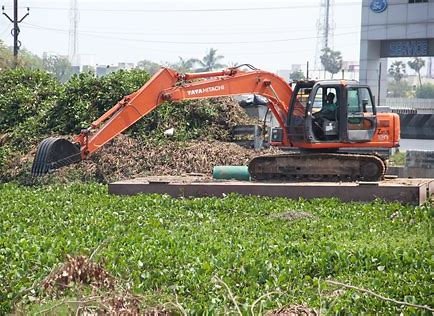Reviving Puzhal Lake: A Crucial Environmental Initiative
Puzhal Lake, one of Chennai’s essential water bodies, is undergoing a transformative cleanup process. The presence of water hyacinth, an invasive aquatic plant, has significantly hindered the lake’s ecosystem by restricting water flow and reducing biodiversity. Recognizing the urgency of the issue, the GCC has deployed a Mini Amphibian machine to tackle the hyacinth infestation effectively.
Spanning 1,100 meters, the lake’s cleaning process has already achieved notable progress, with 900 meters cleared so far. This initiative not only improves water flow but also plays a crucial role in maintaining the ecological balance in the region.
The Impact of Water Hyacinth on Puzhal Lake
Water hyacinth, while visually appealing, is notorious for its negative impact on aquatic ecosystems. It grows rapidly, forming dense mats on the water surface that block sunlight and reduce oxygen levels. This adversely affects aquatic life, disrupts local biodiversity, and impacts the quality of water. Additionally, the plant clogs water flow, leading to potential flooding during heavy rains and reduced storage capacity for water bodies.
Puzhal Lake, a vital source of water for the region, has long suffered from these issues. The current removal efforts are aimed at reversing the damage and ensuring the lake can function optimally as both a water resource and an ecological habitat.
Modern Machinery at Work: The Mini Amphibian Machine
The use of the Mini Amphibian machine has been a game-changer in the cleanup operation. This versatile equipment is designed to navigate shallow waters and remove aquatic vegetation efficiently. Its deployment has accelerated the removal process, allowing workers to cover large areas of the lake in a short time.
By clearing 900 meters of the lake’s total 1,100-meter length, the GCC has demonstrated the effectiveness of integrating modern technology into environmental restoration projects. The use of such machinery not only saves time but also minimizes manual labor and enhances precision.
A Community-Centric Approach to Environmental Restoration
This initiative is part of a broader strategy by the Greater Chennai Corporation to address environmental concerns in Zone 2, Division 18. By prioritizing the restoration of water bodies like Puzhal Lake, the GCC aims to create a sustainable environment that benefits both local residents and wildlife.
Residents in the surrounding areas have welcomed the initiative, recognizing its potential to reduce flooding risks, improve water availability, and enhance the overall aesthetic appeal of the region. Community awareness campaigns have also been launched to educate people about the importance of maintaining clean water bodies and preventing pollution.
The Ecological and Economic Benefits of Clean Water Bodies
The removal of water hyacinth and the restoration of Puzhal Lake bring multiple benefits:
- Improved Water Flow: Clearing the lake ensures better drainage and reduces the risk of waterlogging during heavy rains.
- Enhanced Biodiversity: Removing invasive plants allows native species to thrive, restoring the natural balance of the ecosystem.
- Water Storage Capacity: A cleaner lake can store more water, benefiting the region during periods of drought.
- Tourism and Recreation: A clean and well-maintained lake can serve as a recreational spot, attracting visitors and boosting local businesses.
Future Plans and Sustainability
The GCC’s efforts at Puzhal Lake are part of a larger initiative to restore several water bodies across Chennai. With climate change posing new challenges, the importance of resilient and sustainable water management cannot be overstated.
Moving forward, the GCC plans to implement the following measures:
- Regular monitoring and maintenance of water bodies to prevent the recurrence of hyacinth growth.
- Use of bio-control agents, such as certain insects, to manage invasive plant species naturally.
- Community involvement in maintaining cleanliness and preventing pollution in lakes and rivers.
- Infrastructure improvements, such as building check dams and desilting operations, to enhance water storage and distribution.
Conclusion
The ongoing water hyacinth removal operation at Puzhal Lake underscores the importance of environmental conservation and sustainable urban planning. By addressing the root causes of ecological imbalance and integrating modern technology with community involvement, the Greater Chennai Corporation is setting a benchmark for urban water management.
As Puzhal Lake continues to transform, this initiative serves as a reminder of the collective effort required to preserve and protect natural resources for future generations.







